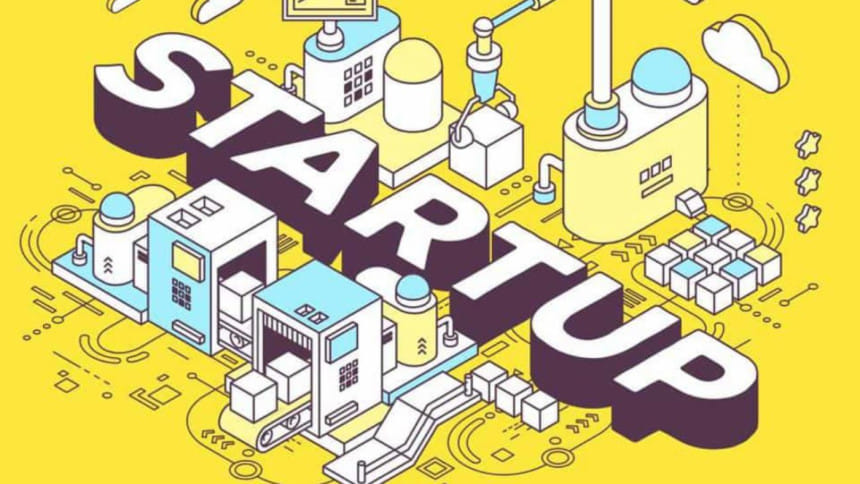Youth entrepreneurship and start-ups

Based on World Economic Forum's (WEF) Inclusive Development Index-2018, Bangladesh ranks 34th, close to China (26th), and ahead of Pakistan (47th) and India (62nd), as of January 22, 2018 (when the IDI was published). One of the major contributors to this growth has been the growth of the start-up arena in Bangladesh.
Growth through the start-up model was envisioned around the end of 2010 in many developing countries. The logic behind the model was simple, encourage entrepreneurs and innovators to come up with good business plans, incubate them in order to develop their minimum viable product or when they are ready to generate steady cash flows, and then these small businesses will contribute to economic growth in two ways—first through creating new employment opportunities and bringing in international clients, and second, by creating innovative solutions to existing problems of the businesses and local industries, thus improving the quality and competitiveness of local firms in the international arena.
Although the model has been an unprecedented success in Bangladesh, leading to many start-up success stories, there have been quite a few challenges as well. From my experience in working as an adviser for start-ups, and from a few research studies done in this arena, the common problems were: lack of funds for scaling up, lack of connections for scaling up, problems in accessing the market, lack of skills of founders, lack of skilled workforce and last but not least, lack of public and private support (although a lot has been done in this context). The first three problems are having an immediate impact on start-ups, but the last three are ones that have and will have much longer lasting impacts.

One very interesting solution to “lack of skills of founders” and “lack of skilled workforce” is the encouragement of youth entrepreneurship. This will not only help solve these problems, but will also have a synergic effect on the success of the start-up arena in Bangladesh, and fuel further economic growth. Let's look at the detail of how encouraging youth entrepreneurship will help, and how to encourage youth entrepreneurship.
The key idea behind youth entrepreneurship is to encourage the youth to think outside the box, to come up with interesting ideas, innovations and solutions to existing problems, and then help them develop these into viable business plans and help them start businesses early in their lives. Good ideas do not necessarily have to come out of university courses and work experiences. Young minds have been scientifically proven to be more creative and capable of coming up with out of the box solutions than older and experienced mindsets.
Experience helps an individual, but it helps in trained thinking, and yet for innovation and radical changes, sometimes a fresh and completely outside perspective helps. This phenomenon is observed in different contexts and have been proven in the Stanford's Spaghetti Marshmallow challenge, where school children outperformed seasoned executive's business school graduates—anyone interested can follow the Ted Talk by Tom Wujec.

So how can encouraging youth entrepreneurship help? If young children are given the chance to exhibit their unique ideas, and if they are nurtured early on, they will then be better equipped as founders of their own ideas early on in their lives. It is a common fact that mental sharpness and agility decreases with age, and the schooling age—mostly from classes 8 to 12 (2nd year of college), the mental acumen of a child is at its peak. Besides making the founders more skilful, nurturing youth entrepreneurs will also create a more skilful base of workers, through diverse skills and learning outside general classroom learning. And this will lead to more enduring start-ups.
But what is the way of achieving this? Youth entrepreneurship can be encouraged through a two-pronged approach—changing the curriculum and changing the way people think about school education. Most of our school curriculums are very limited to subject based studies, exams, handwritten or composed homework, and a good deal of memorisation. To encourage youth entrepreneurship, we need to modify these curriculums. We need to incorporate field visits, or interactions, with successful start-up founders in our country, to inspire school kids to think beyond books, to think of interesting ideas.
Besides science fairs, schools can also spend time in organising business fairs, events in schools where students who are interested present their ideas to parents and to the crowd and even have start-up enthusiasts visit these events. There could also be very basic training sessions—which would include decision making tools, organising methods, basic business schools, etc. Why wait for these children to go to universities to learn these skills when we could start early and reap early benefits?
Another issue with existing curriculums is that it requires mostly an individual effort. Most assignments are individual. Exams, definitely individual. But very few tasks performed in real-life are done individually—most of them require being part of a group and operating effectively in a group. As a university lecturer, this was a key observation for me—many students coming from their high schools find it very hard to work properly in a group, Yet, almost 30-35 percent of a graduate's life is group work. And more than 70 percent of real-life work is done in groups. And group work skills are crucial in a start-up, where the flexible nature of the job and daily challenges mean that to succeed, there needs to be a very good understanding among the small group of employees that make up the company.

Modifying the curriculum is comparatively easier than changing the way people think. Either due to the stress of the curriculum, or due to social norms and comparison, the majority of parents in our country consistently remind their school going children to study harder and score higher in their exams. But such stress to get good marks and to top their classes leave kids with not enough free time to explore their other talents, one of them being their entrepreneurial mindset. A mind consistently under pressure to get a set of answers correct will not be able to think outside the box and come up with creative ideas. Besides a modification in the curriculum, we need our parents to understand the importance of developing the creative side of their children. More so now than ever before, they need to take inspiration from Shukumar Roy's famous poem Sholo Anai Miche, the moral of which does apply regardless of all education, as lack of basic survival skills might lead to all other skills being worthless. So, parents need to understand that it will help their children immensely to have skills outside of the classroom, and need to encourage from home, the drive to develop these skills.
In fact, both the curriculum modification and understanding by parents need to move hand in hand to encourage youth entrepreneurship. Both together can ensure that there are opportunities for school kids to exhibit their innovative and creative skills and for them to come up with business ideas and even start their journeys as young entrepreneurs.
Going back to the problems faced by start-ups over the last few years, the last one mentioned was public and private support. Over the last few years, start-ups in Bangladesh did enjoy a good deal of support from government bodies, especially the ICT ministry. At present the ICT ministry has a programme—Start-up Bangladesh—which is operating with the goal of empowering IT related start-ups to succeed and scale up. With the partnership of Grameenphone, they have launched some batches of GP Accelerator programme, an incubation programme which selects a few potential ideas and teams and help them go to the market with an MVP.

Besides GP Accelerator, Start-up Bangladesh also have their own workspace where they offer training programmes for start-ups. Besides, very recently they have launched Tiger Cage, a programme like Shark Tank, only without the funding as an outcome. But still, such programmes will help a potentially good start-up get its model evaluated thoroughly and get a validation by business experts about their idea and business model. And such validation might also help these start-ups secure funds to scale up. But there is always room for more. All these activities have been concentrated by one government office, but such an admirable drive needs to be present throughout the whole business support infrastructure of the government, from the process of registering a business, to getting funds to all other infrastructure supports.
Another role for the government would be to create a level of stability in the market in order for new ideas and companies to survive. Another very important requirement for any start-up that is based on innovation is the protection of Intellectual Property Rights, so that another party cannot just copy an innovation and gain from it. Such events will discourage efforts to innovate.
Last, but not the least, there needs to be integration between Start-up Bangladesh and other ministries, such as the Education Ministry, to modify curriculums and encourage youth entrepreneurship.
In the private sector as well, there has been a few instances of support for the growth of start-ups. One example already mentioned was that of GP Accelerator. Shared workspaces have also been created for start-ups to set up offices. Moar, located in Banani 11, is an excellent example of such a shared workspace. EMK centre has also offered many workshops and aids in creating the necessary start-up ecosystem. SD Asia, Toru, BYLC and many other organisations have also been helping to nurture start-up founders, help train start-up teams, etc.
A noteworthy mention is that of Toru, an organisation which devotes its resources to help start-ups in rural areas. This has been a big leap in support, as the concept of start-ups and the skills required have always lagged in rural areas. Several other organisations, such as Light Castle Partners, provide consultancy and training for start-ups to analyse their potential market and making financial plans and pitches for investors. One of the major drives that is presently needed in the private sector is that of connecting start-ups with potential market. Many of the larger private organisations can benefit from start-ups, and many already do. Such connection with large corporations will help start-ups to scale up. In fact, there are some projects that are already going on to help start-ups network and build up their connections to the market, to become profitable.
But major support will again require a change in the thought pattern of our society. Given the power of peer pressure, when I was a university lecturer, I had observed many bright young students decide on their career choice as, “working for a well-known company.” Granted, an established business offers higher salaries, better benefits, and a structured job, but there is no logic or justification for looking at a job position in a start-up to be something socially less desirable. Rather, people in general need to understand that all jobs require different levels of skills and different temperament.
A position in an established company is good for those who work in some form of structure, whereas a start-up job role is completely devoid of structure. So, a large portion of our society needs to get out of the stigma or considering a start-up job role as “not as good as a job position in a Multi-National Corporation”. It needs to understand that any job is good, if the person doing the job loves it and is passionate about it.
The arena of start-ups has evolved quite a bit in Bangladesh, and the growth in start-ups is contributing to the economic growth that Bangladesh is enjoying at this moment. But there is always room for improvement, and through a good public and private support and a thriving youth entrepreneurship community, Bangladesh can surely reach much greater heights.
KM Saqiful Alam is presently a PhD Student and Commonwealth Scholar in National University of Singapore (NUS). His area of research is in Innovation and Application of Machine Learning in Business Strategy. He is also an adviser of Intelligent Machines Limited, and a trainer of a World Bank project for helping entrepreneurs to scale up their businesses.

 For all latest news, follow The Daily Star's Google News channel.
For all latest news, follow The Daily Star's Google News channel. 



Comments